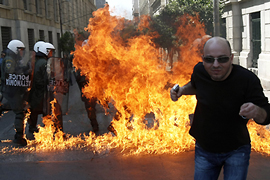Clashes in Greece over budget cuts
Thousands take to the streets to oppose measures aimed at combatting debt crisis.

Angry protesters set fire to garbage cans and a van belonging to state broadcaster ERT and at least 19 people were reportedly arrested by the police.
There were similar scenes in the northern city of Thessaloniki as protesters attacked business premises, smashing store fronts and cash machines.
“No to the IMF’s junta!” protesters chanted, referring to the military government which ruled Greece from 1967 to 1974.
Waving red flags, the crowd at times surged toward the line of police, who wore helmets and carried riot shields. The police pushed them back each time.
‘Peaceful intentions’
Al Jazeera’s Barnaby Phillips, reporting from Athens, said Saturday’s demonstration marched passed the Athens offices of the EU and US embassy but was largely “peaceful”.
| in depth | |||||||||||||||||||||
|
“The vast majority of the protesters came to the capital with peaceful intentions, demonstrated their defiance and their opposition to austerity measures and celebrated their rights in an entirely peaceful manner,” he said.
“But there was also a substantial minority who wanted trouble and got it.”
However, some among the estimated 17,000 demonstrators in Athens were resigned to the fact that the government would go ahead with the austerity measures despite the objections.
“I don’t expect anything to change with this march. We just fight for our dignity,” Sotiris Oikonomou, an insurance worker, said.
Greece, whose $317 billion economy plunged into recession last year, is preparing more than $26.64 billion in budget cuts over the next two years to secure access to an EU/IMF aid package of up to $120 billion.
The bailout package is aimed at pulling Greece out of a severe debt crisis, which has hit the euro and shaken markets worldwide, and threatens the stability of the European currency, the euro.
Euro zone finance ministers are due to discuss the deal on Sunday.
The details of the cuts will not be revealed until after the loan is secured, but George Papandreou, the Greek prime miniser, has warned the country to prepare for a period of hardship.
‘Social battle’
Christine Lagarde, the French economy minister, said she expected agreement could be reached by the end of Sunday.
Analysts say social protests may increase after the summer once the impact of the austerity measures kicks in, and investors are worried this may hamper reforms.
 |
| Thousands took part in May Day rallies called by trade unions and left-wing parties [Reuters] |
The government has already agreed three sets of austerity measures including tax hikes and pension freeze over the last six months, and many fear the EU/IMF plan will hurt their livelihoods further.
One-in-five people in Greece lives below the poverty threshold, according to EU data.
“We will not permit the destruction of our rights, we will block their plans,” a public sector umbrella union, ADEDY, said in a statement.
“It’s time for our biggest social battle.”
Union officials said Greece has been asked to slash its deficit by 10 per cent of gross domestic product (GDP) in 2010-2011 by raising value-added tax (VAT), scrapping public sector bonuses amounting to two extra months pay, and freezing civil servants’ wages in exchange of getting the aid.
A poll by ALCO pollster for the Greek newspaper Proto Thema showed that 51.3 per cent of Greeks would take to the streets if these new measures were agreed.
